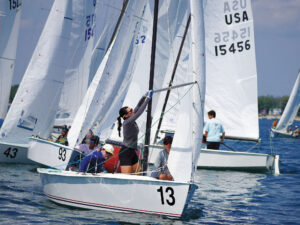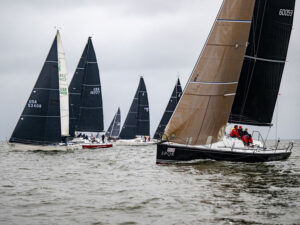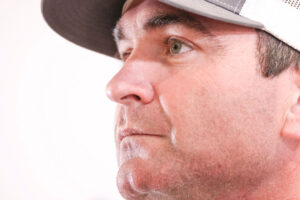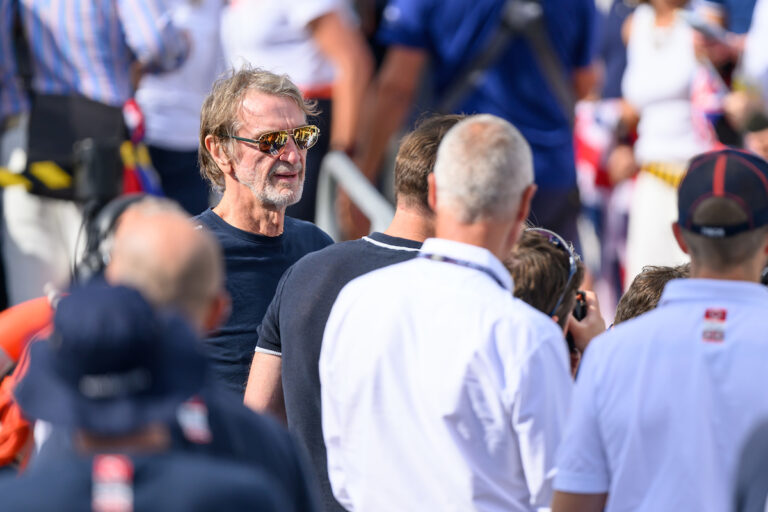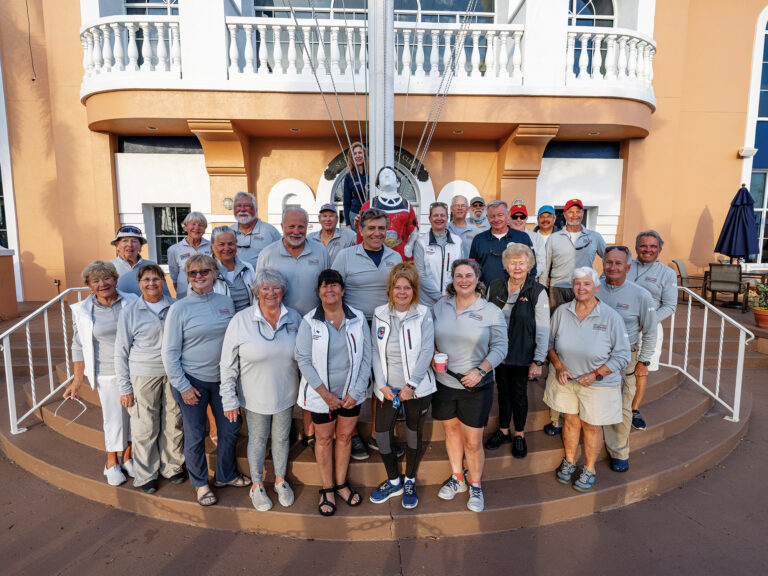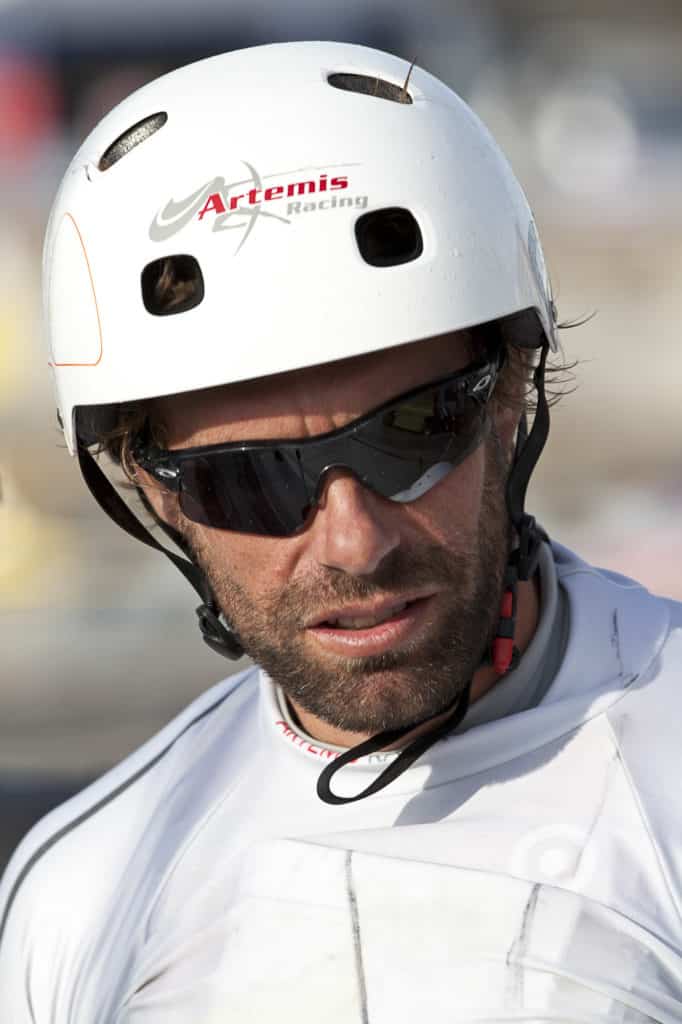
130220_IainPercy
It’s hard to keep a good man down, especially the ebullient Iain Percy. The 36-year old Brit has moved on from a disappointing outcome at the recent Summer Olympics—losing the gold medal in the final race—and is now applying the same zest that won him gold at the Sydney Olympics in 2000 in the Finn class and again at Beijing in 2008 in the Star class to his role as Sailing Director for Artemis Racing, where he’s finally finding his groove in the Cup arena after his experiences with the very underfunded +39 Challenge in 2007 and Team Origin, which was formed to compete for the 33rd America’s Cup but then locked out by the Deed of Gift match between Alinghi and BWM Oracle Racing.
Sailing World: Was the medal race in Weymouth something you agonized over after the dust settled?
Iain Percy: I did have a few sleepless nights over it. It was obviously a very tough day for Andrew and I. It was actually a real bonus to have some racing to turn my attention to because I was really frustrated with the nature of the way that it happened and losing the gold. To be able to really throw your energy into something that’s huge and exciting very quickly drags your attention away from being down about everything.
SW: Will you do another Olympic campaign?
IP: I won’t unless the Star is back in. I think at the moment my tired body would refuse to get back in a Finn so there’s not much chance of that. The Olympics are trying to make it for under-80-kilo (176 pounds) guys in every class so unfortunately that excludes me, even moreso since I’ve been living in America!
SW: How did you manage the stress of an Olympic campaign & your commitment to Artemis?
IP: I don’t get particularly stressed by it all; I enjoyed both aspects a hell of a lot. Obviously when you’re lining up on the start on either the AC45s or starting the first race at the Games, no one’s immune to feeling nervous, but you enjoy that and that’s what you thrive off, going out racing is the reason we’re all sailors. I actually had a really fun year. I really enjoyed the Star with Andrew even if the result didn’t quite work out in the end. It was a busy year for sure and one of the motivations maybe for not looking anywhere near Brazil is that I’ve learned the hard way over the last six years that having two jobs is difficult.
SW: What similarities do you see between an Olympic & an AC campaign?
IP: I think the primary one is that they’re both focused around one event that is everything at the end. It’s so different to other sports or other parts of sailing where you have a circuit for the year. That’s a very important similarity because it’s to do with campaigning and working up to something rather than targets along the way. It’s a very different way of training and preparing yourself both mentally and physically, which I’m used to and have done for a long time in the America’s Cup as well as the Olympics.
But at the end of the day they’re both about a sailing race and my job as tactician has many crossovers with my job as tactician in the Star: negotiating the start, interpreting the wind, and making strategic decisions. There’s also the team work aspect. Olympic sailing has grown over the years and even in our Star team there were about six people involved, albeit not all full-time, but working in that group and getting on with the guys is a big part of it.
SW: What do you bring to the Cup arena?
IP: I still have an Olympic ethos—that focus—I want to win pretty badly when I’m doing something. Sailing for me has never been a job, it’s always been a passion. Artemis is lucky to have a whole team across all the nationalities who share that, and I think people feel that passion from me as well. We’re very focused on that end goal.
SW: How is this Cup campaign different?
IP: It’s unique in a lot of ways. In terms of scale of operation, engineering, design, building, it’s an incredible departure. Anyone who knows anything about our sport comes to a team base and sees the operation is flabbergasted. No matter how big you think previous Cups have been this is a massive scale bigger. Everything is new, every part is engineered as a one-off, we have no experience in designing or building boats like this. It just takes a lot of energy and a lot of time from all departments to pull that together.
SW: What do you do in your role as Sailing Director?
IP: My job in a few months time is to get out there and race as well as we can. There’re many parts to that. There’s the racing element and then there’s using the equipment. We’ve had to get our scheduling in line with the other departments like the build and the design as obviously we can’t go out sailing when the boat needs some improvements, so between myself and the other areas in the team, we hash out the best plan together to get the boat out sailing.
SW: Was it awkward moving into Terry’s role?
IP: There were never any awkward moments. Terry was fantastic for the team and got us into such a strong position. He’s made my job very easy. The guys are all very motivated under Terry and they still are. It was a difficult situation for all of us personally, but I think it was the right move for the team. We’ve got some very talented helmsmen with high performance multihull experience—like Loïck Peyron—who are serving the team very well. It’s working out fantastically, but at the same time we’re very grateful to Terry for setting up such a great structure and environment here at Artemis Racing.
SW: What do you see as Artemis’ strengths?
IP: I feel we are incredibly strong in the helming department—to see Loïck and Nathan working together, bringing the experience and that young enthusiasm and talent together, is awesome to watch. Across the whole boat we have so much experience, with some people coming from either big ORMA French cats and also from the Alinghi project; so we have a lot of experience getting big boats around the course, and there’s going to be a ton of that in this racing. I think as a sailing team we’re really positioned, and I’m proud to be a member of the group we have.
SW: Are you happy with your performance on the 72 so far?
IP: We were out yesterday and thrashed the boat pretty hard at race pace for the last hour or so and we got the boat around the course really well—that’s started to be a real strength for us. Like with any development boat, the improvement in performance is really rewarding because it’s so fast. We’re really well led by Santiago Lange who coordinates between the sailing and design teams. Under his leadership we’ve been able to make huge jumps in performance in a really positive environment.
SW: Are you enjoying sailing on the 72?
IP: It’s a cool boat to sail, there’s no doubt about that. [One of the first days sailing] we carried on just a bit too long because we were enjoying it so much. We were screaming across the Bay going near 40 knots and thinking we might stay out for another half an hour and got a few looks when we came in when it was dark. They are super quick, super powerful, and take a lot of skill to get them around the course so its rewarding as well.

